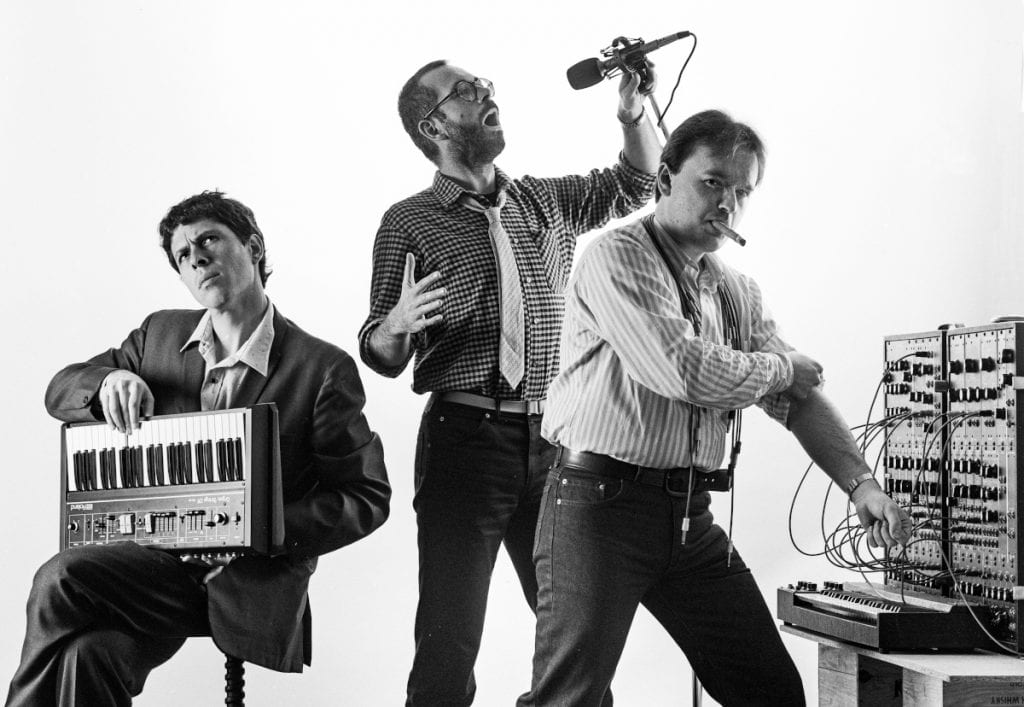Ask somebody about the early days of electronic music and people are likely to mention groups like The Human League or Depeche Mode who helped to popularised synth-pop in the UK. Some might mention Kraftwerk, Throbbing Gristle, electronic experimentation in Jamaican dub music, or perhaps the early 1970s era of progressive rock. A music historian might even cite 1920s composers such as Joseph Schillinger. The origin and evolution of electronic music is a rich and varied topic, but one band that often gets left out of the story is Telex.
Formed in Belgium, 1978, Telex aimed to create something entirely different from the mainstream music scene of the time. Determined to differ from rock music, Telex refused to incorporate guitars within their music, opting instead to use exclusively electronic instruments. Whilst this might not seem like such a revolutionary idea in 2021, in 1978 this really went against the grain of popular music. Electronic pop was often seen as a novelty and treated with suspicion. Electronic music was by no means a widespread concept and received little mainstream attention. Aside from a small handful of isolated artists, Telex’s electronic experimentation had never been done before.
Despite releasing five albums between 1979 and 1988, as well as a reunion album in 2006, producing remixes for Pet Shop Boys and Depeche Mode, and collaborating with Sparks for their 1981 album Sex, Telex never really achieved mainstream success. The band’s only commercial success in the UK was their slow, dispassionate cover of the rock n roll classic ‘Rock Around the Clock’, which peaked at number 34 in the UK singles chart in 1979. The biggest exposure Telex received over here was likely their Eurovision performance in 1980, in which they reportedly hoped to finish in last place with their deliberately banal and cliched song ‘Euro-vision’ (although the entry actually finished in 19th, thanks to 10 points from Portugal).
Telex officially disbanded in 2008 after the death of band member Marc Moulin. A compilation album, Ultimate, was released in 2009 but received little attention and the band appeared to have been lost to obscurity. That was until legendary independent label Mute Records – whose previous releases include the likes of New Order, Depeche Mode, Inspiral Carpets, Yazoo, Moby and Wire, to name but a few – announced a compilation This Is Telex.
The compilation features tracks from throughout the band’s career including two previously unreleased tracks: covers of The Beatles’ ‘Dear Prudence’, and ‘The Beat Goes On’ by Sonny & Cher. All tracks are newly mixed and remastered by the two remaining members of the group, Dan Lacksman and Michel Moers, and they sound utterly incredible! This compilation really goes to show just how ahead of their time Telex were, and hopefully with the distribution powers of Mute they will finally gain the widespread recognition they so rightly deserve. This Is Telex also excellently portrays the versatility of the group: from the moody post-punk atmosphere of ‘The Number One Song in Heaven’ to nightclub floor fillers such as ‘Moskow Diskow’, stopping in between for some wonderfully weird off-beat electro in ‘Dance to the Music’ and ‘Radio-Radio’. A punk attitude, disco tendencies and elements of experimental electronic music combine to form some of the greatest, most idiosyncratic tracks of the 1980s – and they still hold up in the 21st century. According to Mute, This Is Telex is the precursor to a full series of reissues of Telex’s back catalogue. This is excellent news as many of Telex releases have not witnessed official reissues in decades and given how high quality This Is Telex is, we are definitely in for a treat!
Header image: Frank Uyttenhove.

